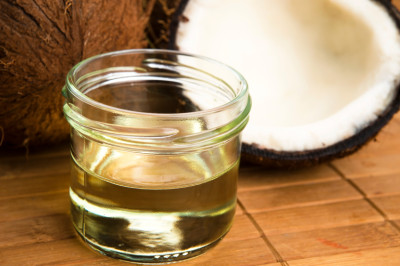We’ve written in the past about the wonders of coconut oil. It’s powerfully antimicrobial, heals the brain (and even alleviates the symptoms of Alzheimer’s disease), promotes weight loss, serves as an incredible replacement for toxic, store-bought cosmetics, and even optimizes oral health.
But there’s a not-so-new kid on the block that’s really starting to pick up momentum as a “competitor” of coconut oil: MCT oil. The acronym stands for medium chain triglyceride, which refers to the fats that make up a portion of coconut oil.
Medium-chain fats are digested more easily and sent directly to your liver, where they have a thermogenic effect and the ability to positively alter your metabolism. This is one reason why many people claim that MCTs, including coconut oil, are burned by the body for energy, or “fuel,” instead of being stored as fat.
The understanding of some health experts is that MCT’s are the most desirable and functional component of coconut oil.
Their logic is therefore that, by removing everything that isn’t an MCT, you’ll be left with a superior product. This process is sometimes referred to as fractionation (and thus MCT oil is also known as fractionated coconut oil).
The benefits of MCT oil
The intention behind MCT oil is to create a product that delivers all the benefits of coconut oil even more efficiently. MCT enthusiasts argue that the MCT’s in coconut oil can only deliver their bevy of benefits once they’re properly digested—a process that can be inhibited by the presence of harder-to-digest long chain fatty acids.
Because fats are broken down by the bile and enzymes that are secreted by the liver, gallbladder, and pancreas, these organs need to be functioning optimally in order for the process to work smoothly.
If instead, they’re overloaded with toxins due to improper diet, stress, and environmental pollution, your body can have a hard time breaking down whole coconut oil. This means that you can suffer from fat malabsorption—rather than delivering all its healthy MCT’s and nutrients, the coconut oil is simply stored as excess fat or excreted.
Pure MCT oil is able to bypass this whole digestive process, so it can much more easily confer its benefits. MCT’s have been shown to combat viral infections and Candida,[1] sexually transmitted diseases like chlamydia, gonorrhea, Herpes simplex 1, and HIV,[2] chronic inflammation and oxidative stress,[3] memory loss and cognitive dysfunction,[4] chronic fatigue, and many other conditions.
But should coconut oil remain as Nature intended?
As Western medicine has had to learn many times before, laboratory-created products are not necessarily better than natural ones. In fact, it usually turns out that the natural version is the superior one.
Many of the studies that have established medium chain fatty acids (MCFA’s) as some of the most healing and versatile compounds on the planet specifically used coconut oil, not MCT oil or other isolates. This is not to say that MCT oil isn’t healing, but only that the claims made about coconut oil’s ineffectiveness don’t always stand up to scrutiny.
Furthermore, MCT oil traditionally doesn’t include lauric acid, which MCT oil advocates argue is processed like a long chain fatty acid in the body. Other studies dispute this claim, maintaining that it should indeed be considered a medium chain fatty acid (MCFA).[5]
However it’s defined, though, the fact remains that lauric acid is widely acknowledged as one of the most important components in coconut oil. It’s arguably the most antimicrobial MCFA of the whole bunch, and it makes up a whopping 50% of coconut oil’s composition.
Does it really make sense to remove such a central component of coconut oil? Does lauric acid really hamper the healing potential of MCT’s, or is coconut oil perfect the way Nature made it, without processing or alteration?
Making a choice
While the coconut oil vs. MCT oil debate will likely rage on for some time, here’s some good rules of thumb for choosing which one to integrate into your own life.
Over 1,500 studies show that raw, virgin coconut oil is almost never a bad choice.[6] If you’re hoping to glean all of the benefits we’ve discussed in this article and others, start with good old coconut oil—it’s cheaper than MCT oil, time-tested, and proven safe for ongoing use.
If, after consuming coconut oil or other saturated fats, you experience diarrhea, bloating, or gas, it could mean that your body has a hard time absorbing fat. In this case, MCT oil could be a very helpful alternative—just be advised that some people experience these same side effects from taking too much MCT oil.
Because it is absorbed much more quickly, MCT oil can also have a faster, more marked effect on cognition and energy levels. As such, it works slightly better than virgin coconut oil as a performance enhancement tool.
Remember, though: regular consumption of coconut oil, coupled with an overall healthy diet and lifestyle, will work wonders for your brain and body, as well—its effects just aren’t felt as acutely as those of MCT oil.
In short: if you have reason to believe that you suffer from fat malabsorption, or if you want to use MCT’s as a targeted, therapeutic aid for losing weight, enhancing cognition, or increasing energy levels, MCT oil could be a great choice for you. See how raw, virgin coconut oil works for you first, though—you might just find that the extra cost of MCT oil is unnecessary for you.
Better yet, find ideal uses for both of them: try MCT oil as a tool for acute performance enhancement, and use coconut oil for all your dietary needs. You’ll be amazed by how quickly your overall vitality and well-being improves when you take the time to build exactly the regimen that works for you.
References
[1] http://www.ncbi.nlm.nih.gov/pubmed/17651080
[2] http://www.ncbi.nlm.nih.gov/pubmed/10448397
[3] http://www.ncbi.nlm.nih.gov/pubmed/24613207?dopt=Abstract
[4] http://www.ncbi.nlm.nih.gov/pmc/articles/PMC3437664/
[5] http://philjournalsci.dost.gov.ph/vol143no2/pdf/Lauric%20acid%20is%20a%20mediuam%20chain%20fatty%20acid.pdf






